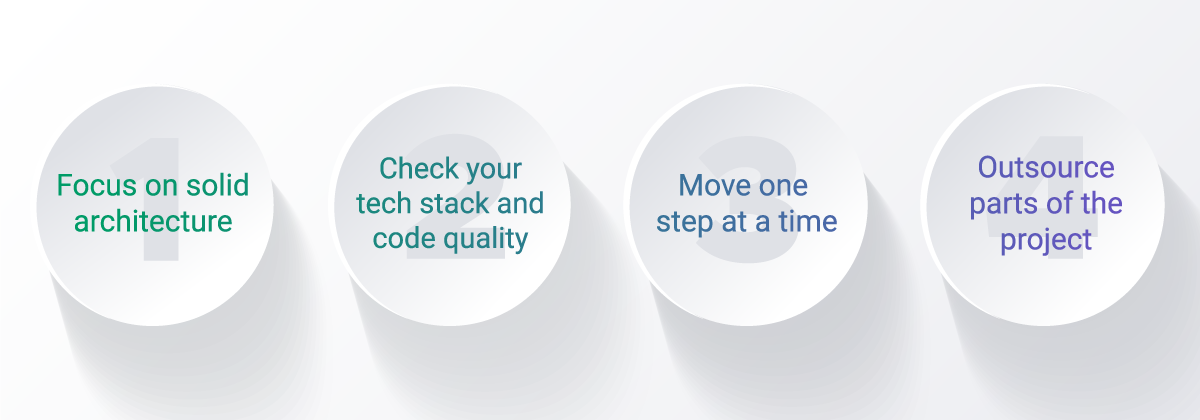So, your startup is growing? That's awesome! In a fast-paced business world, where 9 out of 10 startups fail, making it to the next level is very exciting. However, growth comes with its own challenges, most notably the need to scale your business.
Many factors can prevent a startup from scaling successfully, including a problematic tech stack, legal issues, finance, and staffing. Our experts have put together their top recommendations for startups to keep in mind if they want to scale with greater ease.

1. Focus on Solid Architecture
If you are building a house, you wouldn't put it on unstable terrain; you'd want a good foundation for your investment. The same is true for your business. Having solid architecture from the beginning will bring overall value to your startup, as well as long-term and scalable growth potential.
We recommend that early-stage businesses and startups conduct a discovery or definition phase to make sure they are building with reliable technology and stable architecture that will support their future projects for years to come.
Definition Phase
During this phase, we advise startups to outline their growth plan, for example, how many users they currently have, how many users they predict to have in the next year, and so on.
With more users, your company will need greater server resources to handle additional traffic, and the space becomes exponentially more expensive with more capacity. Instead of simply adding more capacity to the existing server, we advise our clients to first analyze their current products and then explore solutions that serve their needs best.
Scalability
Both horizontal and vertical scalability can be great solutions, but it all depends on the way your product works. And even when one is more cost-effective than the other, it always comes with a tradeoff that potentially builds up more costs for development and maintenance.
This approach requires the architecture to be designed from the very beginning, as a redesign may mean rebuilding the entire product from the ground up, which can prove to be very costly in a very delicate development stage of a startup.
The Right Approach
You wouldn't build a tiny house for a huge family, so don't skimp on architecture if you plan to greatly scale your business. The right architecture should satisfy the level of growth, budget, security, reliability, and performance your business requires now and down the road.
When making a decision about the correct architecture, it's advisable to lean on a Solutions Architect that has sufficient experience in working with startups and can provide you with personalized solutions that will create a solid foundation for your business.
At Softjourn, we take pride in our work on 1000+ projects over the last two decades. Our Solutions Architects ensure that each of our clients feels supported on their development journey, no matter if they are just starting out or are at the enterprise level.
2. Select a Tech Stack That Will Scale
Tech can influence a company's success or failure, which means selecting the best programming languages and software for your startup is an important decision.
At Softjourn, we always advise our clients to always choose effective and scalable tech solutions. If you need your development team to be able to make changes and extend current features easily, using effective technologies like .NET, PHP, JavaScript, or Java can make all the difference.
Plus, by choosing more commonly used technologies, hiring technical support will be much easier. There is no right or wrong tech stack to choose from, but it is crucial to consider what will work best for your goals and industry. With a solid tech stack, you'll have a better shot at staying ahead of the pack and a greater ability to scale your startup as needed.
3. Check the Quality of Your Code
Even if the tech stack is right, poor code will likely have bugs and break more often. As your startup grows, this problem will continue to bubble up everywhere and create more overhead for you and your team.
As you scale, your systems must be able to handle more than before without inefficiency or errors. If you want to ensure smooth functionality, quicker loading times, and faster updates, conducting a code audit will give you the confidence to know whether your code will be able to handle more users and new features.
Many people worry that negative results of a code audit mean that your business must halt to re-engineer or rewrite the code completely. But this is not the case! Most of the time, with the right planning and budget, a competent in-house or outsourced development team can pull off code rewrites while the startup continues to do business as usual.
You don't have to choose between having clean, high-quality code and scaling your startup. Your startup can achieve a code 'glow-up' while still growing and meeting the needs of your customers.

4. Get Outside Help to Scale Faster (and Better!)
Here at Softjourn, we talk to many clients about their architecture and how we can help them solve current issues and identify future problems before they happen.
Recently, we had a client who came to us with a seemingly easy problem. They wanted a simple application audit to fix some bugs in their code before they began to scale up their business and add new features. Unfortunately, when we reviewed their code, the issues we found were very problematic. We suggested that it might be the right time to make some big changes if they wanted to scale their business.
How did this happen? The client had focused on quick development at the beginning and overlooked the fact that they would not be able to grow in the near future with their current code.
In practice, the best way to protect your business from this type of scenario is to ensure your product is scalable from the very beginning of development. However, we know there is no such thing as a time machine, and we rarely recommend that clients fully rewrite their code from scratch.
In this instance, we supported our clients by helping them to rewrite and modernize some parts of their application to improve performance and increase their ability to scale. For any client, we advise regular code audits, especially before any major periods of development or scaling.
You are not alone in your startup journey. A development partner can bring deep experience and immediate knowledge that will help your business grow without friction.
Additionally, we know that, as a startup, every dollar counts. This is why it's not always the best idea to hire a lot of developers from the get-go and spend resources on their onboarding. Instead, when you have short-term tasks or need specific technical expertise, you can outsource highly capable developers for the exact amount of time you actually need them for.
The benefits of outsourcing some of the work to a software development partner:
- Superb talent pool
- Affordable rates
- Can work within your budget and timeline
- Saves valuable time
- Flexibility
- Lower costs for office and other resources
- Access to RnD centers
Best of all, you will gain access to industry and technical experts who will get you on the path to success. Softjourn's expert startup consultants can help you with deciding on the right software architecture in the early stages of the project (the cost of this mistake, later on, can be massive!). We're also able to assist you in mapping your long-term development strategy, reviewing your code, and planning for any needed changes.
Grow, Scale, and Succeed

Rapid changes define the growth phase in every startup. Preparing your startup demands a clear roadmap making it possible for your business to stay on the right track and avoid the growing pains along the way.
Your startup's growth is something you've worked hard for and should be proud of. Don't let premature business growth negatively influence your business if it's incapable of handling the growth. Softjourn is here to support your business through all development stages and make sure you can scale with success.













